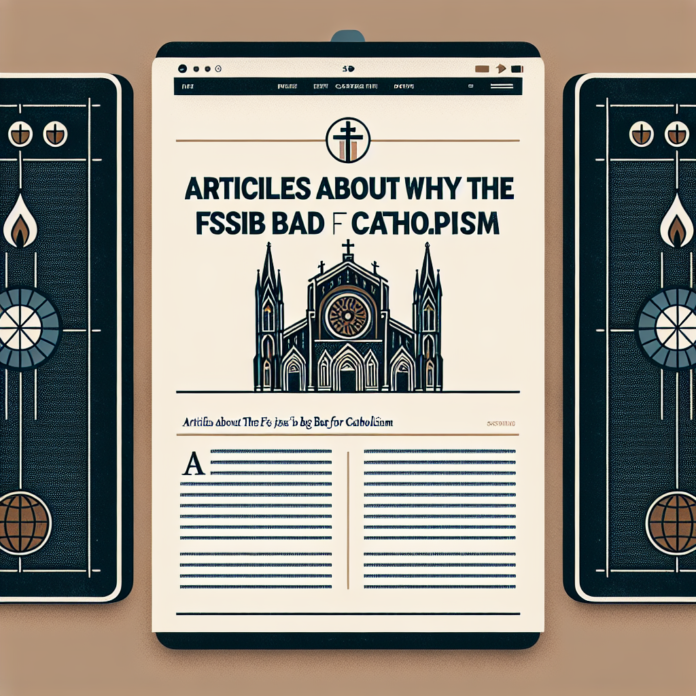An Examination of the Fraternal Society of St. Peter: Challenges for Modern Catholicism
The Fraternal Society of St. Peter (FSSP) has become a prominent force in promoting traditionalist Catholic practices, specifically the Tridentine Mass or the Latin Mass. This movement has been seen by some as a bastion of orthodoxy and a return to the roots of Catholicism. However, a deeper examination reveals that the FSSP’s steadfast adherence to pre-Vatican II liturgical forms may be fostering division within the Church and impeding progress toward a more inclusive and unified Catholic community.
Historical Context and Vatican II
To understand the position of the FSSP within modern Catholicism, it’s essential to revisit the Second Vatican Council (1962-1965), a landmark ecumenical council that aimed to modernize the Church and bring it closer to the contemporary world. Among the numerous changes were liturgical reforms, including the introduction of the Novus Ordo Mass, which allowed the use of vernacular languages rather than the exclusive use of Latin.
The council sought to make the liturgy more accessible to the laity, fostering active participation and a deeper understanding of the faith. It was a historic move toward inclusivity and engagement, aligned with the teachings of Christ emphasizing love, understanding, and acceptance.
The Rise of the FSSP and Its Implications
The FSSP originated in 1988 as a response to the schismatic actions of the Society of St. Pius X (SSPX), which rejected Vatican II reforms. Though the FSSP pledged fidelity to the Pope and the Magisterium, it remained deeply committed to the Latin Mass, gaining members who preferred traditional liturgical forms over the revised practices of Vatican II.
While the FSSP’s respect for orthodoxy is commendable, its emphasis on pre-Vatican II traditions has sometimes resulted in an unintended hardening of divisions within the Church. The Latin Mass, while beautiful and historically significant, may alienate those unfamiliar with its intricacies, thus fostering a sense of exclusivity. This clinging to ancient rites stands in contrast to the spirit of Vatican II, which aimed to make the Church a universal space where all members could feel connected and included.
Social and Theological Implications
Three significant areas of concern emerge from the growing influence of the FSSP: inclusivity, unity, and interpretational rigidity.
Inclusivity
Pope Francis has been a vocal advocate for a more inclusive Church. His approach, which emphasizes mercy, forgiveness, and outreach to marginalized communities, resonates with the call for inclusivity initiated by Vatican II. The Latin Mass, by virtue of its complexity and linguistic barrier, can sometimes be daunting for new believers and those who are less academically inclined in theological matters. This inadvertently pushes away individuals who could otherwise contribute to and benefit from the Catholic community.
Furthermore, an over-emphasis on traditionalism can overshadow the Church’s mission to address modern social issues such as economic inequality, environmental stewardship, and social justice. The focus shifts from active engagement with the world’s problems to internal preoccupations with maintaining liturgical purity.
Unity
A unified Church is indispensable for facing the challenges of the 21st century. However, the FSSP’s strong attachment to the Latin Mass creates fissures within the Catholic populace. It delineates a clear ‘us versus them’ mentality, where those who prefer the Novus Ordo might feel ostracized by their traditionalist counterparts.
Pope Francis’ principle of “accompaniment”—walking with people in their faith journey rather than castigating them for differing views—seems at odds with the FSSP’s more rigid adherence to old rites. The unity Pope Francis envisions includes embracing diversity in liturgical expressions, thus reflecting a wide tapestry of human experience and devotion.
Interpretational Rigidity
One philosophical concern with the FSSP is theological rigidity. The Catholic faith is not merely about preserving doctrines and practices but also about dynamic engagement with an ever-changing world. The dogmatic adherence to the Latin Mass can inhibit intellectual and theological development within the Church.
Progressive values in Catholicism emphasize dialogue, reinterpretation, and reform. The failure to adapt and grow limits the Church’s potential to influence modern society positively. Pope Francis urges a more pastoral approach that meets people where they are, rather than demanding they conform to an idealized version of the past. This pastoral approach includes doctrinal flexibility, which is less apparent in the strictly traditionalist leanings of the FSSP.
Conclusion
The Fraternal Society of St. Peter’s dedication to the Latin Mass embodies a commitment to tradition that, while understandable, is problematic in the contemporary Catholic context. In an era marked by rapid social change, the Church’s mission must include openness to new forms of worship and expression, aligning with the inclusive vision set forth by Vatican II and promoted by Pope Francis.
To remain relevant and vibrant, the Catholic Church must navigate the delicate balance between preserving valuable traditions and embracing necessary innovations. The FSSP’s traditionalism, when adhered to excessively, runs the risk of fostering division, excluding potential believers, and stalling intellectual and spiritual progress.
In the spirit of unity, inclusivity, and theological flexibility, it’s imperative for the Church to transcend internal divisions and present a unified, compassionate front to the world—continuing the enduring mission of serving humanity in the name of Christ.
